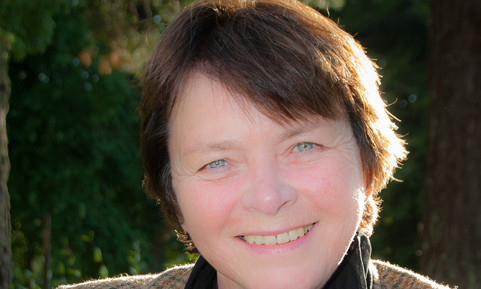
Presenter Frieda Morrison has retrained herself to speak Scots for a new online radio show.
Broadcaster and singer-songwriter Frieda Morrison is fronting a new website-based radio programme where everyone speaks almost entirely in Scots.
Scots Language Radio is a new project dreamed up by the Scots Language Centre, and will feature presenters and guests speaking their native variation of Scots in a bid to encourage others to do the same.
But former BBC presenter Frieda Morrison, who is spearheading the project alongside renowned Scottish musician Steve Byrne, has had to retrain herself after decades of speaking standard English on the wireless.
She told the Sunday Post: “The biggest challenge has been teaching my brain to speak Scots on the radio.
“Scots is very close to my heart and it’s been a return to my original language. My native tongue is Doric or North East Scots.
“When I first started at the BBC, I had to pass exams on speaking correctly for the radio ‘received pronunciation’.
“That’s been drummed into me for so long that I have caught myself trying to go back into English.
“We all tend to reserve Scots for informal situations and speak English when we are in the more formal occasions.
“At Scots Language Radio, we are trying to give people the confidence to enjoy speaking Scots not just informally. And that’s not going to be easy, we are trying to change a mind-set that has existed for centuries.”
Have a listen
Frieda has been a much-loved radio presenter for decades, focusing mainly on countryside and cultural matters.
She finished a 14-year spell of producing and presenting the popular Gardening Programme on Radio Scotland in 2009, and has since set up her own multi-media company filming and producing heritage projects around Scotland.
Last year, she had the honour of being appointed ‘Artist in Residence’ at the School of Celtic and Scottish Studies in Edinburgh University.
Her main focus at the University was on Scots Language and Song. But she has not forgotten her horticultural roots Frieda has just been appointed to the Board of Gardening Scotland, the country’s biggest garden show held at Ingliston.
She is also on the advisory team for Traditional Arts at Creative Scotland.
And while she left the BBC five years ago, a return to radio was inevitable once she heard about the Scots project.
She added: “I really couldn’t say no to Scots Language Radio. I thought it was a fantastic idea.
“Scots is a vital part of our culture and I have always been a big supporter of it.
“When I first heard about the idea of putting the project together, I jumped at the chance to be part of it.
“It’s online, but it’s far more than a podcast. It’s a full hour long and we are treating it very much like a radio programme.
“I’ve not been a presenter for some time, but I had to take this on.”
The launch also coincides with a new project spearheaded by the Sunday Post and the National Library of Scotland (NLS), to introduce Oor Wullie into classrooms across the country in a bid to teach Scots to children.
Popular Scots words
Bairn – child
Braw – attractive/appealing
Dreich – wet and miserable
Flit – move
Scunner – dislike/annoy
Stooshie – argument/falling out
Stramash – uproar/state of confusion
Wean – child/baby
The Scotland Language Radio programme has been launched on the Scots Language Centre’s website, with a fresh edition appearing every month.
As well as featuring various Scots speakers, the discussions will focus on issues affecting Scots language.
Frieda added: “When we first mooted the idea of a programme in Scots and about Scots, I wasn’t sure we would have enough material to keep it going.
“But now that we’ve got started, we’ve got stacks to discuss films, poetry, publishing, comedy, song the list goes on and on.
“We’re more likely to run out of time than things to say!
“It took a bit of getting used to, but I’m feeling much more comfortable speaking Scots into a microphone now.
“I’ve gone from speaking in a studio to ‘spikkin’ in a studio!”

Enjoy the convenience of having The Sunday Post delivered as a digital ePaper straight to your smartphone, tablet or computer.
Subscribe for only £5.49 a month and enjoy all the benefits of the printed paper as a digital replica.
Subscribe